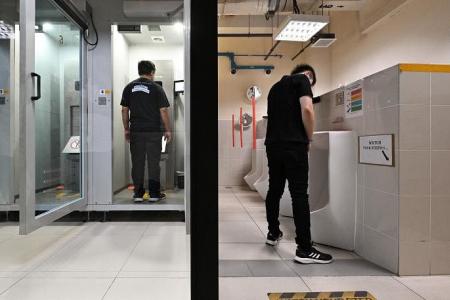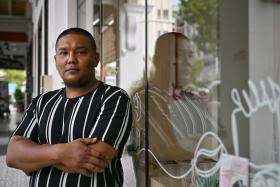S’pore Prison Service trialling automated urine collection and screening system
An automated toilet that screens urine for drugs is currently being trialled by the Singapore Prison Service (SPS), allowing supervisees to do urine testing unsupervised.
The Prison Automated Screening System (Pass), which enables contactless urine collection and testing, with results in under 10 minutes, was developed by the Home Team Science and Technology Agency (HTX) in collaboration with SPS.
The system with four cubicles has been operating at the Selarang Park Community Supervision Centre since September, and the trial is expected to run till February 2024.
The system, the world’s first, registers supervisees using their biometrics before they pass through a metal detector and gantry into the testing area.
Once inside, they enter a cubicle, where their identities are again verified by biometrics.
The cubicle door closes and locks automatically before the supervisee urinates into the collection bowl.
The urine is then processed and tested using robotics while the supervisee waits in the cubicle for the results, which will be available in about five minutes.
If the results are clean, the door unlocks and the supervisee can leave.
However, an officer is activated if the test result requires further analysis or foul play is detected.
Currently, the SPS conducts about 5,000 urine tests per month on supervisees undergoing community-based programmes.
Supervisees are placed on the programmes towards the tail end of their sentences as they reintegrate into society.
Manual urine testing involves an officer watching two supervisees at one time, testing the urine after it has been collected in a cup.
The process for each supervisee can take more than 10 minutes.
As 200 to 300 supervisees need to be processed daily, a single officer on duty would have to typically handle about 100 urine samples every day.
Since the trial began, more than 1,600 urine tests have been conducted by the system, which uses automation, robotics, sensors and deep learning technology.
Deputy Superintendent of Prisons (DSP) Sameeyul Ameen Haji Sulaiman, the officer in charge of the SPS’ Community Corrections Command, said the idea for an automated system came about after a prison officer saw an open toilet cubicle beside a pub in Europe.
He said: “We thought, why don’t we have something like that, but enhanced like a photo booth, with machines doing everything?”
He said that the SPS then approached HTX for help.
Dr Daniel Teo, deputy director at HTX’s Robotics, Automation and Unmanned Systems Centre of Expertise, said he was enthused by the idea.
“Pass may look like an ordinary mobile toilet, but there is more to it than meets the eye,” he said.
“It is HTX’s first attempt to automate an end-to-end urine procurement and screening process in a fully unsupervised and hygienic manner to improve the process and working environment of our Home Team officers involved in the drug supervision programme.”
DSP Sameeyul said that prison officers have been testing the system with tricks that some supervisees use to cheat on the tests.
Such tricks include depositing prepared urine samples, and dropping water-cleaning crystals into the urine.
He said that while cheating is very rare, the system has proven robust enough to detect foul play.
Pass can also prevent contamination of samples.
“With Pass, an officer is activated only if there is an issue, and prison officers can now be freed to perform other higher-order tasks, such as identifying supervisees who require greater intervention,” he said.
“If we can, I would want at least 10 such cubicles here.”
Deputy Assistant Commissioner of Prisons Karen Lee, director of the SPS’ Community Corrections Command, said Pass is an example of how technology can make the supervision of offenders in the community more efficient and effective.
“SPS hopes to deploy Pass islandwide if the trial is proven to be successful,” she said.
“Supervisees could then save time and resources, travelling to a more convenient location for their urine supervision. They would also be better able to focus on their reintegration journey, maintaining a lifestyle free from drugs.”
Get The New Paper on your phone with the free TNP app. Download from the Apple App Store or Google Play Store now


